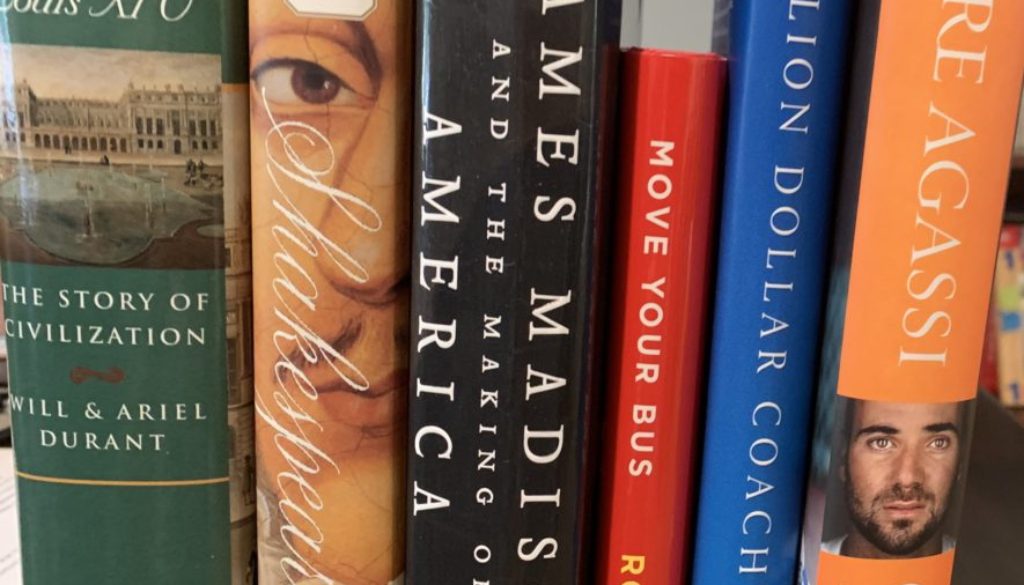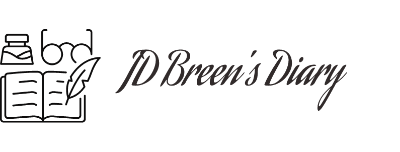Book Reports

Atlanta, GA
August 10, 2019
I cannot live without books.
– Thomas Jefferson
School is back. Last week David started his first year of high school, Alexander his last. The air, if not the calendar, carries a slight semblance of the season associated with a return to campus.
Among the more amazing events in a fairly eventful year is that I am able to write this outside, sitting on my back deck on another in a series of very pleasant August mornings.
The elevated deck was recently reinforced and re-stained, and below me the ground…supported by a new five foot high wall…is several feet closer than it was a few weeks ago. It remains bare…red Georgia clay awaiting whatever assortment of soil, seed, sod, plant, or pavement we decide to place upon it.
This morning the keyboard is my plow, despoiling digital terrain with my own brand of fertilizer.
As of last December I have been alive half a century. As of last week I have been married half those years. And as of today it seems as if we have been upgrading our property at least half of that time.
Considerable time and money have gone into the effort but, unlike many things that absorb time and money, this will produce something real, tangible, and (God willing) durable.
Simple and sturdy is welcome in an age that rushes at us as if thru a kaleidoscopic looking glass. Cell phones adhere to our eyes like ice to a Minnesota windshield. Newspapers are full of farce, fraud, and fools.
Headlines and debates distract with absurd epithets that no self-respecting speaker of the English language would ever utter. It’s unreal…as if WWE cage matches were being staged down the rabbit hole.
Consequential news, if dispensed at all, is relegated to back pages, or at least below the fold. With apparent nonchalance, debts continue to rise, bombs continue to fall, and Central Banks enable all of it by holding interest rates below market levels like a beachball under water…hoping to somehow get out of the pool before letting go.
As I often do when the present becomes unbearable, I turn to the past.
I have many faults but, aside from an inexplicable need to inflict these missives on weary readers, few temptations.
Among them are a compulsion to accumulate books like the Kennedys collect women. Rarely, however, do I toss books aside or pass them among my friends after I have used them.
As my sons must report on their summer reading, I now do so on mine. This summer I have completed several books, the antiquity of the topic varying directly with my need for diversion.
I started in May…in France. Actually, a return visit, taking refuge in the eighth installment of Will Durant’s incomparable Story of Civilization. I last read this volume a couple decades ago, and it’s comforting to know the masterful storytelling, comprehensive perspective, and elegant prose are still there when I need it.
I empathized with the Dauphin Louis XIV as the future Sun King escaped the tumult of the Paris Fronde for the serenity of his father’s hunting lodge at Versailles.
The boy and the lodge grew, as ego and exorbitance overwhelmed and intoxicated the upper-crust of Europe. As the streets of Paris and countryside of France continued to simmer, the native yeast eventually rose up.
Despite (or, rather, because of) a court unrivaled since Rome in its patronage of art, literature, and splendor, the loaf suddenly exploded in the face of Louis’s great-great-great grandson, 75 years after the Sun finally set.
From Le Grande Siècle in France, we hopped the channel, and paid our respects to Elizabethan England…by doubting the identity of its greatest playwright.
Relying on extensive biographical clues in the Sonnets, and scant evidence that William of Stratford had any obvious literary talent or first-hand knowledge of foreign people and places referenced in the plays, Joe Sobran reasserts not only that Stratford did not write the works attributed to “William Shakespeare”, but that Edward de Vere, Seventeenth Earl of Oxford, did.
While I am not knowledgeable enough to know if it is convincing, Alias Shakespeare makes a case that is compelling and enjoyable, and that has also been made by such luminaries as Mark Twain, Sigmund Freud, and David McCullough.
Alternative candidates have popped up through the years, including Francis Bacon, Walter Raleigh, and even Elizabeth herself. Some are ridiculous, and none are so plausible as Oxford, but all rile proponents of the traditional Stratfordian view, who, in the manner of our morning papers, enliven the heated debate with invective, derision, and contempt. Oxfordians can take comfort in the old saw that if you are drawing flak, you must be over the target.
Whoever wrote the plays would likely have been ambivalent about the controversy. After all, as anyone who has suffered these notes might imagine, writers often wish their words could be attributed to someone else.
Moving from the 16th to the 18th century, and from Mother England to its daughter States, we next checked in on James Madison.
At this point, our reading becomes a bit more practical. Kevin Gutzman wrote James Madison and the Making of America not as a standard biography, but as a political one, focusing several chapters on Madison’s indispensable rôle…for better or worse…in exchanging the Articles of Confederation for a new Constitution of the United States.
Lessons in persuasion, rhetoric, and style abound, providing insights to Madison’s political methods, and useful guides for our own. We delve in detail into his copious notes from the Philadelphia convention, and into his subsequent polemical essays that contributed to what we know as The Federalist.
His collaborator in that effort would soon become his antagonist. Operating for two decades as the tip of Jefferson’s spear, Madison would apply his penetrating intellect and indefatigable genius to thwart the aspirations of Alexander Hamilton.
Madison and Jefferson won a few battles but, looking around us today, we lament that they lost the war. Since Lincoln plastered over the mosaic of sovereign states with the fresco of a consolidated “nation”, our style is sporadically Jefferson…but our substance is emphatically Hamilton.
Lincoln evoked the words of the former, but contorted them to the mold of the latter. It has hardened under subsequent centralizing applications. And so we have the daily news referenced earlier in this note.
As I become less reflective on where I have been and more focused on where I am going, my reading has moved nearer in time and closer to earth.
Bill Bonner’s insightfully whimsical Win-Win – or Lose, explains how uninhibited, mutually beneficial exchanges are the cornerstone of civilization, while coercive or crony engagements undermine society’s structure. Compulsion and meddling jeopardize personal, business, and civic relationships, stimulating strife, stifling knowledge, and impeding prosperity.
As Bonner says, life gives you answers. But it must be allowed to speak the truth. Bring out a pistol and the room goes silent. Win-lose deals—done at the point of a gun—tell you little.
Ron Clark, with whom my wife has worked to support his pioneering and successful academy in Atlanta, wrote a short, astute book on leadership, teamwork, and individual effort that can be read in a day.
Ironically, I was given Move Your Bus by my last boss at Equifax, who tended…as the Earl of Oxford might say…to honor it in the breach. Nonetheless, its lessons are simple yet profound, as most valuable teaching is. You can spend your life however you like, but you can only spend it once.
The late Bill Campbell exemplified the type. Eric Schmidt and a couple Google colleagues tell his tale and convey his methods with extensive admiration and obvious gratitude.
Over coffee last month, a prominent Atlanta Technology attorney recommended I read this story of a former college football coach who did not enter business till his forties, as a Vice President at Kodak. I am very glad I did.
The Trillion Dollar Coach relocated to Silicon Valley, helped revive Apple, guide Google, and support innumerable high-tech stalwarts and start-ups with his unpretentious perspectives on personal relations and team dynamics. He was CEO of Claris and Go Corporation…and mentor, counselor, and guru to almost every other executive in the area.
He was honest and direct, yet respectful and tactful. Like Benjamin Franklin, he believed you can get away with insulting someone in private. He may even thank you for it. But when you do so in public, he may think you mean it.
Additional insights in personal development came from an unexpected source. A very successful entrepreneur suggested Andre Agassi’s autobiography. I rarely read books by celebrities or athletes, but Open lives up to its name, and to the entrepreneur’s recommendation.
Agassi is remarkably forthright about his rigorous childhood regimen, his disdain for the sport that would define him, his challenges on the tour, and the sordid or sustaining relationships through which he would persevere or prosper.
The writing alone is worth the read. I was so impressed by it that, with only Agassi’s name on the cover, I had to flip to the Acknowledgments to confirm whether a 9th grade drop-out could turn phrases as deftly as he returned serve.
There I learned, almost to my relief, that Pulitzer Prize winning author JR Moehringer had converted Agassi’s taped conversations into such pleasing prose.
Thoroughly entertaining, the book was naturally self-serving and by no means consistently credible. In Moehringer’s hands, however, our subject occasionally manages to convince us he is humble, contrite, and sincere.
And, as they say in politics, sincerity is the key. If you can fake that, you’ve got it made.
JD



